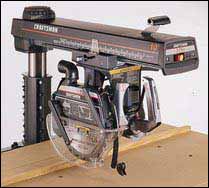 |
| The Contractor |
Contracting instead of being an employee can be financially rewarding. Employers are often willing to pay a premium to get skilled help on a temporary basis. On the other hand, there is very little security with contract employment. If things go bad for the business, you are going to be the first to get let go. The employer may fail to pay you. Of course there is not that much security with regular employers these days.
Contracting is likely to be a short term arrangement, meaning you are going to be looking for another gig in short order. I was talking to a couple of remodeling contractors at my house one day, and one of them mentioned that he really had to devote 20% of his time to looking for new work. His jobs lasted no more than two or three days. He could have a fistful of job orders in his hand one week, but if he didn't keep looking, in a couple of weeks he would be out of work completely. This is really bad if you have a crew working for you. No work and they are liable to run off and start working for someone else.
Half of contracting is simply doing what you promised to do, like show up on time. When we were looking for contractors to work on our basement, we had one guy come out who was highly recommended, but he could not deliver his estimate on the appointed day. In fact he was like a week late. If he cannot deliver his estimate in a timely manner, what is going to happen when it is time to get the actual work done? He may have been a better choice, but screwing up this apparently simple matter really put us off.
Money can sometimes be a secondary consideration. When we were trying to get a small attic finished, we had several guys come look at it, but only one even gave us a bid. It was a small complicated job, but we wanted it done. He charged what I considered reasonable, but some people might have blanched.
 |
| Rebuilding the Indian by Fred Haefele |
Sometimes it does go the other way. I try and get three bids for any work I want to get done. I have had tree trimmers come out a couple of times and their bids are all over the map. One guy did want more than three times what the guy I hired wanted.
On the other side of coin, all of my experience in working as a contractor comes from the high tech arena, where giant corporations hire people who supposedly have the skills necessary for the development of complex electronic whoser-whats-its. These contracts tend to be longer term, measured in months if not years, though the IRS has cracked down on what were essentially permanent contract employees. This business goes through boom and bust cycles. In the boom times being a warm body can qualify you for a gig. When the bust happens, nobody has a job. In this line of work, you need to make hay while the sun shines, and sock it away because the bust is coming and you are going to need that hay.
I remember when it looked like the boom was going to go on forever, and then one day the bottom just fell out. Stock prices dived, projects were canceled, people laid off. I am not quite sure where we are now with high tech. The war in Iraq has really siphoned a lot of money (hundreds of billions) from the American economy. I wonder where it went, I mean it went somewhere. Where did it all go?
Many contracting jobs go through agencies, and most of those agencies are pretty opaque. They keep their rates confidential, that is both the rate they pay to the person who does the work and rate they collect from the employer who hires them. By keeping everyone in the dark they hope to maximize their profit margin. I suspect that most (opaque) contracting agencies pay the worker bee about 50% of what they charge the employer, and the person who actually handles the deal may get half of that, or 25%, which leaves 25% for the agency.
Of course there are some unscrupulous agencies that will try to pay people as little as 15 or 20% of what they are charging the employer, meaning the worker is getting $20 an hour for a job they are charging the employer $100 or even $125 an hour.
Now as a worker, I would have trouble with getting only 15 or 20 percent of the deal, but with these confidential arrangements, I will never know. 50% I can live with. 60% would be better, but let's not put the cart before the horse.
Agents have a skill set I do not, so if they can keep me employed and pay me enough, I don't have a problem with them making a ton of money for doing what is apparently nothing. Because it is not nothing. You have to keep up a relentlessly positive attitude and present it to people continuously for the off chance of getting a reward. The rewards can seem to be based entirely on luck, so you would have to be a bit of a gambler. Contracts may be few and far between. You many only land one or two contracts a year. I could not do that.
About The Lead Photo
This was one of the first pictures to pop up when I Googled images of contractors and I just couldn't resist using it. I saw the movie and it was pretty good. There was another movie with a similar premise, if not a similar title, out at the same time, starring Morgan Freeman. Another example of the twin movie thing. Snipes was recently convicted of tax evasion or some such, but you can read about that anywhere. Lena Headey is the girl in the background. She also played the Queen in 300.
Update December 2016 replaced missing picture, fixed broken link.































 My brother just sent me a message:
My brother just sent me a message:



